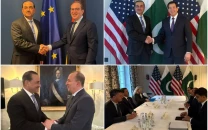An operation in Punjab?

An operation in Punjab?
The emergence of centres of extremism in southern Punjab has continued for years. The interior minister’s suggestion of a willingness to do so is welcome. What is worrying is the response of the Punjab government. Its law minister says that military operations are required only in ‘‘no go’’ areas, that there are no such zones in the Punjab and that the interior minister is seeking to destabilise the province. He does not say what should be done, short of an operation, to deal with groups based there. Perhaps Rana Sanaullah would prefer to leave them untouched. The minister has been associating with a leader of the Sipah-i-Sahaba in Jhang, for electoral mileage, despite the fact that the group has been banned for almost eight years. This does not demonstrate respect for the sanctity of the law. It adds to the suspicion that the Punjab government – for all Chief Minister Shahbaz Sharif’s rhetoric against militancy – has no desire to go after extremists in the Punjab. The denial that these groups even exist in the province serves no purpose at all. It is failure to take action which has lead to the killing of scores in Lahore. This is the price of failing to take on the militants. Tragically it has been paid for by a minority community.
The failure by politicians, bureaucrats and law enforcers to act against extremism is one reason why it has spread so rapidly. There have been suggestions of connivance with sectarian forces from within the administrative set-up. It is possible these links still exist. If this is the case they must be broken otherwise no military operation can succeed. The operation, planned in the congested cities of the south, must be carefully conceived so that it has maximum effect and can round up those who head extremist groups of various kinds. There can be no doubt that such action would help introduce some stability and calm. The Punjab government needs to work with the centre to conceive how this can be best managed. If it fails to do so it will be guilty of working with the terrorists rather than against them.
Other longer term measures are also needed. The hundreds of madrassahs operating in Punjab with a concentration in the impoverished south need to be regulated. Registration schemes have been considered in the past but never properly enforced. When General Pervez Musharraf was in power, promises were made that the madrassahs would be brought under the ambit of regulation, just like the mainstream system of schooling. That did not happen, and worse still, even the latter has degenerated over the years to a state where the graduates that it produces, by and large, do not possess critical thinking and analytical skills and in fact are not very different from their counterparts produced by the madrassahs, in terms of an isolationist worldview that tends to blame the whole world for everything that happens inside Pakistan.
There has to be a concerted effort – by the government and by each one of us – to stop the spread of hatred. Laws exist for this purpose, such as the one which prohibits the use of loudspeakers for anything other than the azan, and they need to be implemented. They must be used to prevent minds from being poisoned so that we can stop young men, such as those who carried out Friday’s assault, from falling into the hands of the extremists.
Published in the Express Tribune, June 1st, 2010.



















COMMENTS
Comments are moderated and generally will be posted if they are on-topic and not abusive.
For more information, please see our Comments FAQ